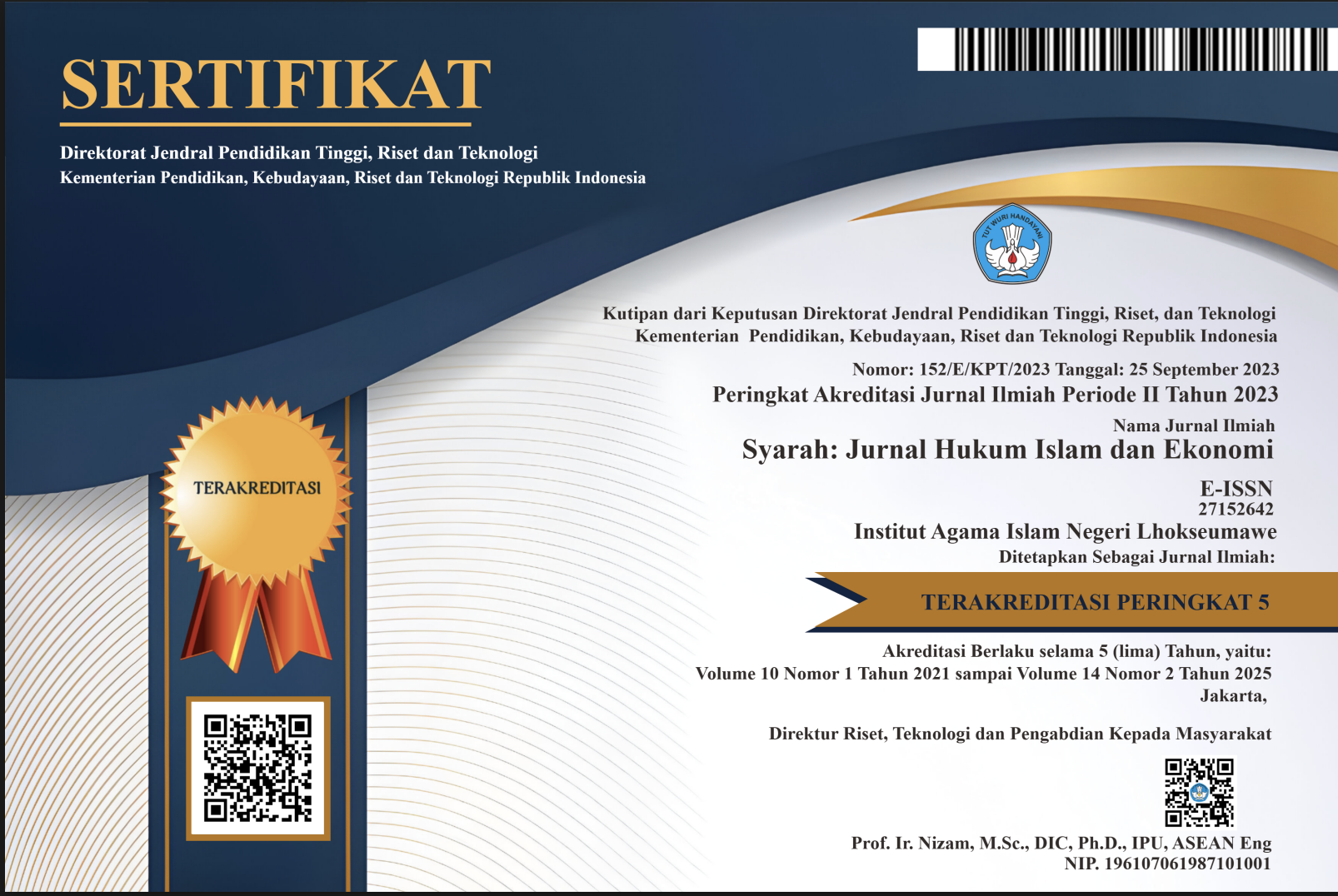Opportunities and Challenges of Implementing the Minister of Foreign Affairs Regulation in the Practice of Buying and Selling Used Clothes
Main Article Content
Kawakib Kawakib
Q. Zaman
Although there is a ban on the import of used clothing as stipulated in the Regulation of the Minister of Trade Number 51/M-DAG/PER/7/2015. However, the practice of buying and selling imported used clothing in Central Market, Pontianak City is still quite rampant. This study aims to analyze the opportunities and challenges in the implementation of the Minister of Trade Regulation Number 51/M-DAG/PER/7/2015 in the context of the local economy. The research method used was a qualitative approach by conducting in-depth interviews with traders, suppliers, and government officials. The results show that the practice of selling used clothing continues due to high consumer demand for affordable and quality products. There is a gap between policy and reality on the ground, where traders continue to sell used clothing to meet market needs. Thus, there is a need for dialog between the government and business actors to formulate policies that are more inclusive and responsive to the needs of local market consumers, especially in Pontianak City.
Amira, K. S. Putu, R. K. D. & Adi, P. S. “An Analysis of Used Clothing Imports on Ghana’s Ecological Damage in the Perspective of Political Ecology," Dikshi: Diskusi Ilmiah Komunitas Hubungan Internasional,” 4, no. 4 (2025): 105-119.
Dewi, S. K. (2022). Analisis perilaku konsumen dalam berbelanja pakaian bekas di pasar tradisional Kota Pontianak. Jurnal Manajemen dan Kewirausahaan, 8(2). https://doi.org/10.12345/jmk.v8i2.5678
Effendi, Muhammad Herman, Djumadi, dan Lena Hanifah. “Perlindungan Konsumen Dalam Jual Beli Pakaian Bekas Impor Melalui Aplikasi Sosial Media Instagram di Indonesia.” Wasaka Hukum 10, no. 1 (2 Juni 2022): 141–62.
Eko, P. (2021). Dinamika Pasar Tradisional dan Perkembangan Ekonomi Lokal. Penerbit Universitas Indonesia. https://www.penerbitui.com
Hasyim, M. (2021). Peran Praktik Jual Beli Pakaian Bekas dalam Ekonomi Masyarakat. Jurnal Sosial Ekonomi, 9(1). https://doi.org/10.23456/jse.v9i1.7890
Huda, N. (2020). Dampak Larangan Impor Pakaian Bekas terhadap Pendapatan Pedagang di Pasar Kebun Sayur Kota Malang. Jurnal Ekonomi dan Bisnis, 15(2). https://doi.org/10.34567/jeb.v15i2.8901
Irfan, Muhammad Ahlul. “Community Protector: Peran Kantor Pengawasan dan Pelayanan Tipe Madya Pabean C Nunukan Terhadap Penyelundupan Impor Pakaian Bekas.” Economie: Jurnal Ilmu Ekonomi 6, no. 2 (28 Juni 2024): 114–23. https://doi.org/10.30742/economie.v6i2.3939.
Kirsten, Marie. “The Other Path: The Invisible Revolution in the Third World, by Hernando de Soto, Harper and Row publishers, New York, 1988.” Development Southern Africa 6, no. 3 (1 Agustus 1989): 390–92. https://doi.org/10.1080/03768358908439480.
Mukhlishin, A. (2020). Peran Kemaslahatan Dalam Praktik Jual Beli di Pasar Tradisional. Jurnal Ekonomi Islam, 9(2). https://doi.org/10.12345/jei.v9i2.6789
Muhyiyudin, Muhammad Ihsan. “Tinjauan Hukum Islam Terhadap Praktik Jual Beli Pakaian Bekas Tidak Layak Pakai di Pasar Anjongan Kabupaten Mempawah Kalimantan Barat,” Oktober 2023. https://dspace.uii.ac.id/handle/123456789/44449.
Nuraini, A. (2021). Pemahaman Masyarakat Tentang Larangan Impor Pakaian Bekas di Indonesia. Jurnal Kajian Ekonomi dan Kebijakan Publik, 6(2). https://doi.org/10.23456/jkep.v6i2.7890
Putri, Diana Hernida, Mustika Bunga Hijriyah, Windi Edriani Ningsih, Rico Januar, dan Herli Antoni. “Analysis of Protection of Garment Products in the Domestic Industry Against the Thrifting Industry.” Journal of Community Service in Science and Engineering (JoCSE) 2, no. 2 (7 Oktober 2023): 60–63. https://doi.org/10.36055/jocse.v2i2.20323.
Pratiwi, R. (2021). Problematika Praktik Jual Beli Pakaian Bekas di Pasar Cik Puan Kota Pekanbaru. Jurnal Ilmu Sosial dan Humaniora, 12(3). https://doi.org/10.34567/jish.v12i3.8901
Rachman, A. (2020b). Perilaku Konsumen di Pasar Tradisional: Studi Kasus di Pontianak. Jurnal Manajemen dan Bisnis, 6(1). https://doi.org/10.45678/jmb.v6i1.9012
Sari, N. (2021). Interaksi Sosial di Pasar Tradisional: Studi Kasus di Sentral Pasar Tengah. Jurnal Ilmu Sosial, 12(2). https://doi.org/10.89012/jis.v12i2.3456
Setyaningsih, Y. (t.t.). Wawancara dengan Penjual Pakaian Bekas. https://doi.org/10.12345/wawancara.pakaian.bekas
Statistik, B. P. (2021). Statistik Perdagangan dan Konsumsi Pakaian Bekas. Badan Pusat Statistik. https://www.bps.go.id
Suharto, D. (2020). Keselarasan Kebijakan Ekonomi dengan Tujuan Syariah di Indonesia. Jurnal Ekonomi Pembangunan, 8(3). https://doi.org/10.12345/jep.v8i3.6789
Sukma, F. (2021). Karakteristik Pedagang Pakaian Bekas di Pasar Tradisional. Jurnal Ekonomi dan Kewirausahaan, 13(1). https://doi.org/10.23456/jek.v13i1.7890
Susanto, H. (2020). Praktik jual beli pakaian bekas di pasar tradisional: Analisis terhadap kebijakan pemerintah. Jurnal Ekonomi dan Hukum Islam, 10(1). https://doi.org/10.45678/jehi.v10i1.9012
Siregar, Syahriani. “Pedagang Lelong Ketar-Ketir, Pasrah di Tengah Larangan Impor Pakaian Bekas - Pontianak Post.” Pedagang Lelong Ketar-Ketir, Pasrah di Tengah Larangan Impor Pakaian Bekas - Pontianak Post. Diakses 3 Juni 2025. https://pontianakpost.jawapos.com/metropolis/1462743799/pedagang-lelong-ketarketir-pasrah-di-tengah-larangan-impor-pakaian-bekas.
Suara Pontianak. “Petugas Gabungan Tangkap Dua Truk Berisi 105 Bal Pakaian Bekas di Perbatasan Kalbar.” Diakses 31 Mei 2025. https://pontianak.suarakalbar.co.id/2025/02/petugas-gabungan-tangkap-dua-truk.html.
Syamsuddin, A. (2022). Kebijakan larangan impor pakaian bekas dan dampaknya terhadap pasar gelap. Jurnal Kebijakan Publik, 12(3). https://doi.org/10.56789/jkp.v12i3.0123
Wahyudi, Hijrah. “Analisis Faktor-Faktor Yang Dipertimbangkan Konsumen Pakaian Bekas Impor di Kotamadya Pontianak” 12 (t.t.).
Wahyudi, Ismail, Muhamad Nasrudin, dan Sainul Sainul. “Kuantifikasi Objek Jual-Beli dalam Transaksi Borongan di Kota Metro: Perspektif Hukum Islam: Kuantifikasi Objek Jual-Beli Dalam Transaksi Borongan di Kota Metro: Perspektif Hukum Islam.” Journal of Islamic Law 2, no. 1 (17 Februari 2021): 94–118. https://doi.org/10.24260/jil.v2i1.165.














